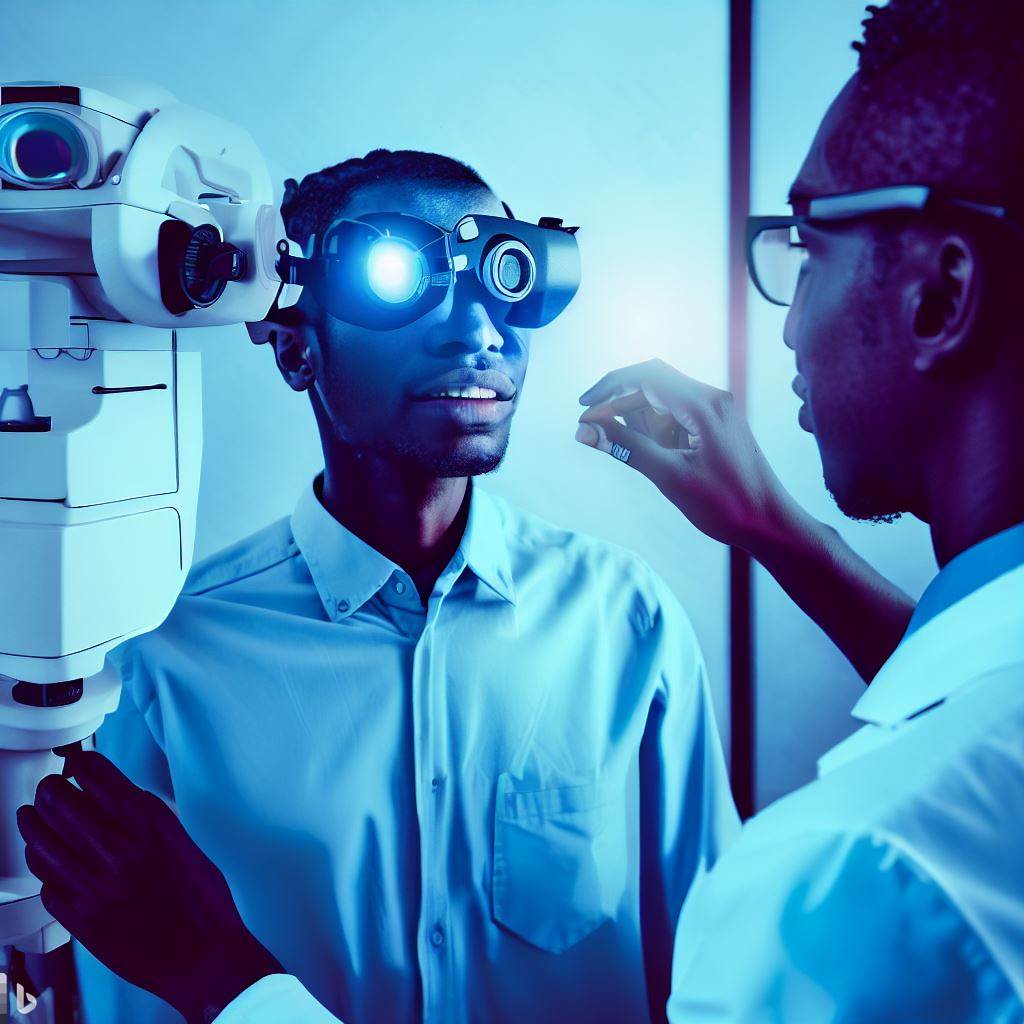Introduction
MRI technology is a vital tool in modern healthcare, providing detailed images for accurate diagnosis. The role of MRI technologists in operating and maintaining MRI machine is crucial.
However, Nigerian MRI technologists face numerous challenges that need to be addressed.
MRI, or Magnetic Resonance Imaging, is a medical imaging technique that uses strong magnetic fields and radio waves to create detailed images of the body’s internal structures.
These images provide valuable information for the diagnosis and treatment of various medical conditions.
MRI technologists play a significant role in the entire process of MRI imaging. They are responsible for operating the machines, ensuring patient safety, and acquiring high-quality images.
Additionally, they are skilled in troubleshooting technical issues and maintaining the MRI equipment to ensure its optimal performance.
Unfortunately, Nigerian MRI technologists face several challenges in their day-to-day work. These challenges include a lack of access to advanced training and professional development opportunities.
Limited availability of necessary resources and equipment also hinders their ability to deliver high-quality imaging services.
Furthermore, there is a shortage of MRI technologists in Nigeria, leading to increased workload and burnout among existing practitioners.
Inadequate government support and funding for healthcare infrastructure further exacerbate the challenges faced by these technologists.
In this blog post, we will delve into the specific challenges faced by Nigerian MRI technologists and discuss potential solutions to overcome these obstacles.
By addressing these challenges, we can enhance the effectiveness and efficiency of MRI imaging services in Nigeria, ultimately improving patient outcomes.
Lack of Adequate Training and Education
One of the significant challenges faced by Nigerian MRI technologists today is the lack of adequate training and education opportunities.
Specialized education programs for MRI technologists in the country are limited, hindering them from gaining in-depth knowledge and skills specific to MRI technology.
This scarcity puts technologists at a disadvantage in providing accurate and high-quality scans.
Continuous professional development is essential for MRI technologists to stay updated with advancements in the field. However, in Nigeria, opportunities for advanced training and professional growth are scarce.
The limited availability of such programs hampers technologists’ ability to enhance their skills and knowledge, preventing them from adopting new techniques and practices.
The absence of proper training significantly impacts the quality of MRI scans conducted by technologists.
Poor patient positioning may lead to suboptimal image quality, and inadequate knowledge of imaging protocols and parameters can result in misinterpretation of scans and incorrect diagnoses.
As a consequence, patient care suffers, with longer wait times and potential risks to patients’ well-being due to a lack of comprehensive understanding of MRI safety protocols.
It is crucial for educational institutions and healthcare organizations in Nigeria to prioritize the development of specialized MRI technologist programs.
Collaborating with international organizations and experts can establish training courses and certification programs.
Additionally, providing funding and support for technologists to attend conferences, workshops, and pursue advanced certifications can bridge the gap in continuous professional development opportunities.
By addressing the lack of adequate training and education, Nigerian MRI technologists can enhance their skills, improve scan quality, and ultimately elevate the standard of patient care in the country.
Read: Impact of Economic Factors on O&P Practice in Nigeria
Equipment and Infrastructure Issues
In Nigeria, MRI technologists confront significant challenges due to outdated or inadequate MRI machines and facilities, profoundly impacting healthcare quality and diagnostic accuracy.
Outdated or inadequate MRI machines often lack the necessary advanced features, hindering technologists from obtaining clear images and potentially leading to misdiagnoses or missed diagnoses.
Limited access to necessary machine parts causes delays in repairs and maintenance, disrupting hospital workflow and compromising patient care.
Insufficient infrastructure, such as cramped workspaces and resource constraints, further complicates the smooth operation of MRI departments.
Overcrowding and prolonged waiting times impede timely patient appointments.
These challenges have significant consequences on accurate diagnoses and patient outcomes. Delayed or inaccurate diagnoses can hinder timely treatments and worsen conditions.
Patients may endure unnecessary pain and suffering, affecting their overall prognosis.
Urgent interventions are needed at the governmental and institutional levels. Prioritizing healthcare infrastructure development, investing in advanced MRI machines, and establishing reliable supply chains are essential.
Allocating funds for regular maintenance and improving department infrastructure will enhance technologists’ efficiency, benefiting patients and healthcare in Nigeria.
Read: Phlebotomist’s Career Outlook in Nigeria for 2023-2028
Limited Career Advancement Opportunities
Exploring the career growth prospects for MRI technologists in Nigeria is crucial, considering the lack of recognition and promotion opportunities within the healthcare system.
This limited career advancement can lead to serious implications on job satisfaction and retention, leaving technologists feeling stagnant and unfulfilled in their professional growth.
To address this concern, the healthcare system in Nigeria must prioritize creating a clear career advancement path for MRI technologists.
Access to training programs and professional development opportunities can enhance their skills, knowledge, and expertise, making them valuable assets in the field.
Recognition of their contribution through promotions can boost morale and motivation.
Furthermore, the lack of career advancement opportunities affects the overall quality of the MRI workforce in Nigeria.
Without avenues to progress, attracting and retaining talented individuals becomes challenging, potentially hampering quality healthcare delivery.
Young professionals may be deterred from entering the field, fearing limited growth potential.
To rectify this situation, collaboration between healthcare institutions, professional bodies, and policymakers is crucial.
Implementing clear career progression models, recognition systems, and promotion policies are essential steps.
Improving financial incentives and benefits for MRI technologists can contribute to greater job satisfaction and retention.
Proactive measures from the healthcare system will attract and retain highly qualified professionals, ensuring the quality of healthcare services provided.
Investing in the career development of MRI technologists is an investment in the progress of MRI technology in Nigeria and ultimately enhances the healthcare landscape in the country.
Read: Understanding the Role of an Optometrist in Nigeria’s Healthcare
List of Financial Challenges Faced by Nigerian MRI Technologists
Financial constraints significantly impact their well-being and motivation, leading to numerous hardships in their professional and personal lives. Some of the key financial challenges include:
- Low Salaries: MRI technologists in Nigeria often earn low salaries compared to their counterparts in other countries. The disparity in compensation hampers their financial stability.
- Lack of Reimbursement for Additional Training or Certifications: The cost of continuing education and obtaining advanced certifications is not usually reimbursed by employers in Nigeria.
- Inadequate Benefits: Many MRI technologists in Nigeria do not receive comprehensive benefits packages.
The lack of health insurance, retirement plans, and other essential benefits adds to their financial burden and insecurities. - High Cost of Living: The general high cost of living in Nigeria compounds the financial challenges faced by MRI technologists.
- Limited Career Growth: The limited opportunities for career growth in Nigeria’s healthcare system pose significant financial challenges for MRI technologists.
Without clear pathways for advancement, it becomes difficult for technologists to earn higher salaries and improve their financial situation. - Increased Cost of Advanced Medical Equipment: The constant advancements in medical imaging technology require technologists to stay updated with the latest equipment.
However, the high cost of acquiring and maintaining state-of-the-art MRI machines places an additional burden on their finances. - Lack of Government Support: MRI technologists in Nigeria often lack sufficient government support, which could alleviate some of their financial burdens.
Limited funding for healthcare infrastructure and education programs indirectly affects their salaries and opportunities for growth.
The financial challenges faced by Nigerian MRI technologists have far-reaching consequences.
To address these issues, stakeholders should increase salaries, offer reimbursement for training, and provide comprehensive benefits.
Read: Success Stories: Nigerian Agricultural Engineers

Regulatory and Policy Issues
In Nigeria, MRI technologists face several challenges due to existing regulations and policies that hinder their progress in the field.
These challenges greatly affect the growth and development of the profession and have consequences on the healthcare system as a whole.
Existing Regulations and Policies
- Limited Recognition: The profession of MRI technologists is not yet fully recognized and regulated by the Nigerian government.
- Lack of Licensing: There is no standardized licensing process for MRI technologists in Nigeria.
- Undefined Scope of Practice: The scope of practice for MRI technologists is not clearly defined, leading to confusion and limitations in their responsibilities.
- Inadequate Training Institutions: There are limited institutions offering specialized training for MRI technologists in Nigeria, resulting in a shortage of skilled professionals.
- Lack of Continuing Education Opportunities: There is a lack of ongoing training and professional development opportunities for MRI technologists.
Need for Updated Regulations and Policies
It is crucial for Nigeria to establish updated regulations and policies that support the growth and development of MRI technologists. These include:
- Profession Recognition: The government should officially recognize MRI technologists as healthcare professionals.
- Licensing Process: Implementing a standardized licensing process can ensure the competence and credibility of MRI technologists.
- Clear Scope of Practice: Defining the responsibilities and limitations of MRI technologists can enhance their effectiveness and ensure patient safety.
- Accredited Training Institutions: Increasing the number of institutions offering specialized MRI technologist programs can address the shortage of skilled professionals.
- Continuing Education Programs: Providing ongoing training and professional development opportunities will enable MRI technologists to stay updated with emerging technology and advancements.
Consequences of Regulatory and Policy Challenges
The regulatory and policy challenges faced by MRI technologists have significant consequences on the healthcare system in Nigeria:
- Delayed Access to Healthcare: Limited recognition and licensing result in a shortage of MRI technologists, causing delays in accessing diagnostic services.
- Lower Quality of Healthcare: The lack of defined scope of practice and inadequate training institutions can lead to compromised quality of MRI services.
- Decreased Trust in the Healthcare System: Inefficient policies and regulations can erode the public’s trust in the healthcare system and its ability to provide reliable diagnostic services.
- Stifled Technological Advancements: Without updated regulations and policies, the adoption of new technologies and best practices in MRI imaging may be hindered.
In essence, the current regulatory and policy issues faced by MRI technologists in Nigeria pose significant challenges to their profession’s growth and development.
Addressing these challenges through updated regulations and policies is vital to support the healthcare system’s overall improvement and ensure quality diagnostic services for all Nigerians.
Possible Solutions and Recommendations
Potential solutions to address the challenges faced by Nigerian MRI technologists:
- Provide more funding for the healthcare sector to improve infrastructure and equipment.
- Implement policies that encourage continuous professional development for MRI technologists.
- Create a standardized framework for licensing and certification of MRI technologists.
- Establish collaboration between healthcare institutions and academic institutions to ensure ongoing training and education.
- Encourage networking and knowledge sharing among MRI technologists through conferences and seminars.
- Recognize and reward excellence in the field of MRI technology through professional awards and incentives.
The importance of government support, financial investment, and collaboration with international organizations
The Nigerian government should prioritize healthcare and invest adequate resources in the sector.
Seek partnerships with international organizations to gain access to technology advancements and knowledge sharing.
Promote collaboration between Nigerian MRI technologists and their international counterparts for skill development and exposure.
Encourage international organizations to provide grants and funding for research and training programs in Nigeria.
The need for establishing accredited training programs and creating career advancement opportunities
- Develop accredited training programs that comply with international standards to ensure quality education for MRI technologists.
- Promote internship and apprenticeship programs to provide practical experience to aspiring MRI technologists.
- Create career advancement opportunities such as specialization tracks, leadership roles, and mentorship programs.
- Collaborate with international organizations and universities to offer advanced courses and certifications for MRI technologists.
- Establish career counseling services to guide MRI technologists in mapping out their professional growth.
By implementing these solutions and recommendations, Nigerian MRI technologists can overcome the challenges they currently face.
Government support and financial investment are crucial for improving the healthcare sector and providing technologists with the necessary resources.
Collaboration with international organizations will enable knowledge transfer and access to advanced technologies.
Furthermore, accredited training programs and career advancement opportunities will enhance the skills and professional growth of MRI technologists.
It is essential to prioritize the development of MRI technology in Nigeria to ensure high-quality healthcare services and meet the demands of an evolving medical field.
Read: The Path to Becoming a Surgeon in Nigeria
Conclusion
Nigerian MRI technologists face several challenges in their profession. These include inadequate training and education, limited career opportunities, and lack of recognition and support from the healthcare system.
Addressing these challenges is crucial for the improvement of healthcare in Nigeria.
MRI technologists play a vital role in diagnosis and treatment, and ensuring they have the necessary resources and support will enhance the quality of patient care.
It is important for readers to support initiatives that aim to uplift the MRI technologist profession in Nigeria.
This can be through advocating for better training programs, lobbying for increased recognition and support, and creating opportunities for career advancement.
By supporting these initiatives, we can contribute to the overall development of healthcare in Nigeria and provide better access to accurate diagnostic imaging for patients.




